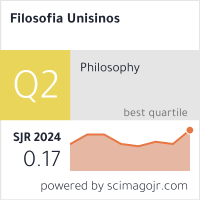To be (something) or not to be: Existence and predication in Aristotle’s logic and metaphysics
DOI:
https://doi.org/10.4013/4634Resumen
This paper offers a new interpretation of Aristotle’s logical system that allows us to break away from a presumably inescapable dilemma inherent to any attempt of justification from a strictly formal standpoint; namely, either the system stands apart from any standard system of mathematical logic — propositional logic, class theory, quantification theory, etc. — or it is lacking in consistency. While some other attempts have been made that seem to avoid this dilemma, they have always resulted in an intolerably strong restriction of the Semantics underpinning the Aristotelian system. These are, therefore, unsatisfactory solutions that undermine some of the key principles of Aristotelian metaphysics. One by-product of the solution presented here is a reappraisal of some elements in Aristotle’s theory of Being that breaks down several contemporary misconceptions on the subject.
Key words: logic, Aristotle, justification, mathematical logic.Descargas
Métricas
Descargas
Publicado
Cómo citar
Número
Sección
Licencia
Concedo a revista Filosofia Unisinos – Unisinos Journal of Philosophy o direito de primeira publicação da versão revisada do meu artigo, licenciado sob a Licença Creative Commons Attribution 4.0 (que permite o compartilhamento do trabalho com reconhecimento da autoria e publicação inicial nesta revista).
Afirmo ainda que meu artigo não está sendo submetido a outra publicação e não foi publicado na íntegra em outro periódico e assumo total responsabilidade por sua originalidade, podendo incidir sobre mim eventuais encargos decorrentes de reivindicação, por parte de terceiros, em relação à autoria do mesmo.










